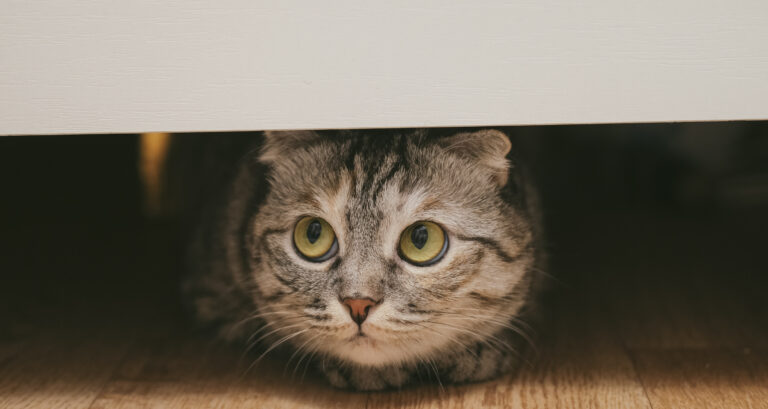11 Sounds Cats Hate (and Why They Drive Your Cat Crazy)

Some sounds are music to your cat’s ears, like the crackle of a treat bag or the pop of a wet food can. Others? Not so much. In fact, there are certain sounds cats hate so much they’ll bolt under the bed or shoot you a look of utter betrayal.
Understanding which noises stress out your feline companion is important. And it’s not just because noises that scare cats are no bueno. It’s because repeated exposure to distressing sounds can lead to cat anxiety, behavioral issues, and even health problems.
By learning about sounds that make cats go crazy, you can create an environment where they feel safe and at ease. And that’s better for their overall health and well-being. So let’s take a closer look at the sounds that rub cats the wrong way and why.
Cats and Sound: Why Are Some Sounds Annoying to Cats?
Cats experience the world very differently than humans do. Some stimuli that may be no big deal to you might drive your pet up a wall. And sound can play a big part in how felines perceive the world.
“Cats’ sense of hearing is four to five times more sensitive than ours,” says Stephen Quandt, CFTBS, FFCP, founder of Feline Behavior Associates. “That means that cats may be afraid of things we can’t even hear,” he adds.
Felines can pick up higher frequencies and detect the faintest rustles of prey in the grass. This superpower helps explain why certain sounds can feel irritating or overwhelming to them.
“Cats generally dislike loud or jarring noises, unexpected noises, or new sounds that they haven’t encountered before or recently,” Quandt says.
Some of this is instinctive and evolutionary. As both prey animals and predators, felines are wired to respond quickly to sounds that could signal danger.
That said, every cat is unique. While many cats dislike the same sounds, Quandt explains that tolerance can vary depending on feline personality, experiences, and environment. “A cat’s underlying temperament greatly impacts how they react to sounds,” he says.
Some cats may also learn to tolerate noises that may have previously caused them stress, especially if they associate the noise with a positive outcome.
What Noises Freak Cats Out? 11 Sounds Cats Hate

Knowing your pet’s noise sensitivities helps you create a calmer, safer environment for your furry bestie.
So, what noises tend to push a cat’s buttons? Here are 11 common sounds felines typically hate:
1. Vacuum cleaners
The roar of a vacuum is one of the top offenders for cats. Quandt explains that “the vacuum machine monster,” as he calls it, is not just noisy, but it also moves around the house. So your pet may see it as a noisy predator chasing them.
2. Fireworks
The loud booms, sharp crackles, and bright flashes of fireworks can be overwhelming for cats. Because the noises are sudden and irregular, they may mimic the unpredictability of natural dangers, such as falling rocks or cracking ice. For many felines, their instinct is to run and hide somewhere they feel safe.
3. Thunderstorms
Some sounds scare cats not only because they’re loud, but because they signal impending danger. Quandt says that thunder is a good example. He explains that its booming, unpredictable claps are startling on their own. However, they also trigger a cat’s innate warning system because they signal weather shifts that could pose a threat.
From an evolutionary standpoint, being cautious of thunder gave cats a better chance of survival because it drove them to seek shelter before conditions worsened.
On top of this sound sensitivity, cats can sense changes in barometric pressure. That may explain why they often appear unsettled even before the first rumble of thunder.
4. Loud household appliances
Blenders, hairdryers, and coffee grinders all fall into this category. Their sudden start-and-stop sounds combined with mechanical whirring can easily overwhelm a cat’s finely-tuned hearing.
5. Aluminum foil
You might not think twice about tearing off a length of aluminum foil or balling up used tinfoil in the kitchen. But these innocuous household noises are common sounds that annoy cats.
Aluminum foil already has a few strikes against it. Its strange texture and flashing, reflective surface tend to spook some felines. But the loud, unexpected sound of tearing tinfoil and the metallic crunch of crumpled foil tend to set many cats fleeing.
That may be because these noises mimic sounds of danger in nature, like thunder or the rustling of a predator in the underbrush.
6. Warning sounds from other cats
“Hissing, growling, yowling, and spitting from other cats is instinctively stressful,” Quandt says. These vocalizations are feline warning signals meant to convey aggression or territorial claims.
Even if the sounds aren’t directed at them, most cats will still become tense or anxious if they hear them, since their instincts tell them conflict could be close by.
7. Hissing noises
Spray cans, aerosol bottles, or the hiss of a radiator can trigger fear in felines. Cats may hate this sound because it is similar to a cat’s hiss, which is a universal feline warning signal.
To your pet, this may register as an angry cat sound—even if there are no other felines nearby. When they hear it, they may instinctively interpret it as a threat.
8. High-pitched electronic beeps
What do microwave timers, smoke detectors, and phone alarms have in common? They all produce sharp, repetitive beeps that are prime examples of high-frequency sounds cats hate.
While these noises are loud for humans, the piercing beeps can feel overwhelming to a cat’s sensitive ears.
9. Screaming or loud arguments
Cats are very attuned to shifts in human tone of voice. Shouting or raised voices can signal danger or conflict, which may cause stress, hiding, or changes in your pet’s behavior.
10. Barking dogs
Quandt says barking dogs can trigger fear in cats for two reasons. He explains that cats may be genetically predisposed to view barking as a sign of a potential predator.
Fear of barking can also be learned. If your pet has had a stressful encounter with a dog, they may associate all barking with potential danger.
11. Construction or outdoor noise
Hammering, drilling, or other heavy construction sounds are unfamiliar and jarring to most cats. Since they can’t predict or escape these sounds, they often retreat to the quietest place they can find.
Noises Cats Hate: Why It Matters

Recognizing the sounds that stress your cat is an important part of keeping them comfortable, calm, and healthy. Our felines can’t tell us what bothers them, but they do communicate through body language.
So, how do you determine what sounds your pet dislikes, and what should you do about it?
- Watch their body language: Look for pinned-back ears, a twitching tail, wide eyes, crouching, hiding, vocalizing, and displaced aggression. Displaced aggression occurs when the cat directs their aggression toward a specific thing, such as you or another pet, when they’re actually bothered by something else.
- Look for patterns: Pay attention to when and where your cat reacts. Do they always run under the bed when the blender turns on? Do they cower in fear every time there’s thunder? Recognizing patterns can help you pinpoint which specific sounds your pet dislikes and how intensely they react.
- Avoid using scary or annoying sounds as punishment: Clapping, hissing, or making loud noises may deter unwanted feline behaviors. However, using a cat repellent sound in this way can also damage your cat’s trust in you and create more fear.
- Limit exposure when possible: If you know certain sounds upset your cat, try to minimize their exposure to them. For example, try lowering the volume on alarms, or running noisy appliances like dishwashers when your cat isn’t close by.
- Offer safe spaces: Give them access to quiet hiding spots with cozy bedding where they can retreat if a noise bothers them. Cats love to utilize vertical space, so a cat tree with a hideaway bed may be a great option.
- Use counter-sounds: Gentle music, white noise, or your calm voice can help mask or soften noises that annoy cats.
- Desensitize gradually (if needed): For unavoidable sounds like vacuums, thunder, or fireworks, try gradual exposure in a controlled setting. For example, you can try playing thunder recordings at a low volume. At the same time, offer your pet treats, gentle play, and/or comfort to help them form a positive association.
- Ask your vet about calming supplements or medication: If your cat struggles with extreme noise sensitivity or anxiety, talk to your veterinarian. They may recommend calming supplements, pheromone diffusers, or, in severe cases, medication to help them cope.
The Bottom Line on Sounds Cats Hate
“The bottom line is that cats use sounds, and their interpretation of them, to evaluate threats, real and imagined,” Quandt says. “Learned responses, genetically determined aversions, and the volume, tenor, quality, and meaning behind sounds all contribute to your cat’s reaction.”
By learning to recognize and respect your cat’s sound sensitivities, you can help reduce their stress and strengthen their trust in you. And when a cat feels safe, secure, and understood, that’s when their happiest, most affectionate selves shine through.









